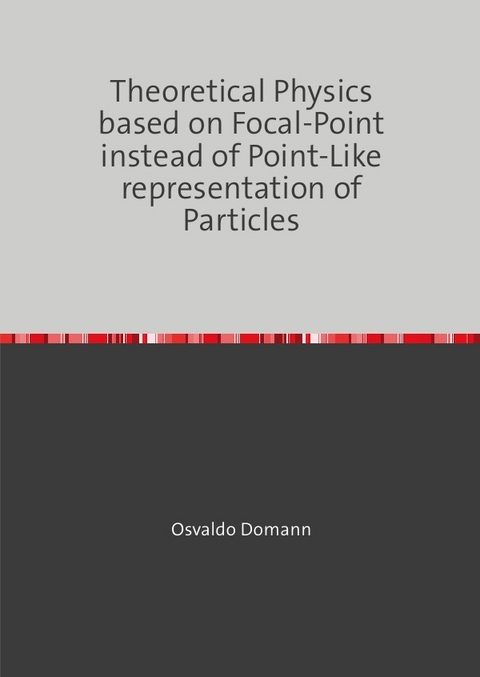
Theoretical Physics based on Focal-Point instead of Point-Like representation of Particles
”Emission & Regeneration” Unified Field Theory
Seiten
2024
|
5. Auflage
epubli (Verlag)
978-3-7598-2165-2 (ISBN)
epubli (Verlag)
978-3-7598-2165-2 (ISBN)
A theoretical model is presented where subatomic particles are described as focal-points of rays of Fundamental Particles with angular momenta, which constitute the unified field of interactions.
The Standard Model has passed many steps in the evolution to the
presently accepted version. The main difference between steps consists in
the description of the mechanism about what happens in the space between
attracting or repelling subatomic particles. The first primitive description
postulated the existence of a substance named ether responsible for the
transmission of forces between particles. Then an empty space was postulated
and special carrier particles for each type of force were introduced
(photons, gluons, Wand Z bosons, gravitons) as a substitute for the ether.
The proposed approach models subatomic particles such as electrons and
positrons as focal points in space where continuously fundamental particles
are emitted and absorbed. The energy of electrons and positrons is
distributed on their fundamental particles and stored as rotations at them,
defining longitudinal and transversal angular momenta (fields). Interaction
laws between angular momenta of fundamental particles are postulated
in that way, that the basic laws of physics (Coulomb, Ampere, Lorentz,
Maxwell, Gravitation, etc.) can be mathematically derived. This methodology
makes sure, that the approach is in accordance with the basic laws
of physics, in other words, with well proven experimental data. Due to the
description of a particle extending dynamically over the whole space, the
present approach is not forced to introduce an artificial substance (aether)
or substitute objects (bosons).
All forces are mathematically derived from one vector field generated by
the longitudinal and transversal angular momenta of fundamental particles,
and not introduced through individual fittings as it is done by our Standard
Theory.
The Standard Model has passed many steps in the evolution to the
presently accepted version. The main difference between steps consists in
the description of the mechanism about what happens in the space between
attracting or repelling subatomic particles. The first primitive description
postulated the existence of a substance named ether responsible for the
transmission of forces between particles. Then an empty space was postulated
and special carrier particles for each type of force were introduced
(photons, gluons, Wand Z bosons, gravitons) as a substitute for the ether.
The proposed approach models subatomic particles such as electrons and
positrons as focal points in space where continuously fundamental particles
are emitted and absorbed. The energy of electrons and positrons is
distributed on their fundamental particles and stored as rotations at them,
defining longitudinal and transversal angular momenta (fields). Interaction
laws between angular momenta of fundamental particles are postulated
in that way, that the basic laws of physics (Coulomb, Ampere, Lorentz,
Maxwell, Gravitation, etc.) can be mathematically derived. This methodology
makes sure, that the approach is in accordance with the basic laws
of physics, in other words, with well proven experimental data. Due to the
description of a particle extending dynamically over the whole space, the
present approach is not forced to introduce an artificial substance (aether)
or substitute objects (bosons).
All forces are mathematically derived from one vector field generated by
the longitudinal and transversal angular momenta of fundamental particles,
and not introduced through individual fittings as it is done by our Standard
Theory.
Dipl. Ing.
| Erscheinungsdatum | 03.06.2024 |
|---|---|
| Sprache | englisch |
| Maße | 210 x 297 mm |
| Gewicht | 1368 g |
| Themenwelt | Naturwissenschaften ► Physik / Astronomie |
| Schlagworte | Beyond the standard model • bosons • focal-point particles • Gluon • Gravitation • new physics • New theoretical physics • point-like particles • quantum mechanics • Quarks • Relativity • standard model • theoretical physics |
| ISBN-10 | 3-7598-2165-0 / 3759821650 |
| ISBN-13 | 978-3-7598-2165-2 / 9783759821652 |
| Zustand | Neuware |
| Haben Sie eine Frage zum Produkt? |
Mehr entdecken
aus dem Bereich
aus dem Bereich
Eine Einführung in die Allgemeine Relativitätstheorie
Buch | Softcover (2023)
De Gruyter Oldenbourg (Verlag)
CHF 89,95
Problem Solving with Python
Buch | Softcover (2024)
Wiley-VCH (Verlag)
CHF 149,95


